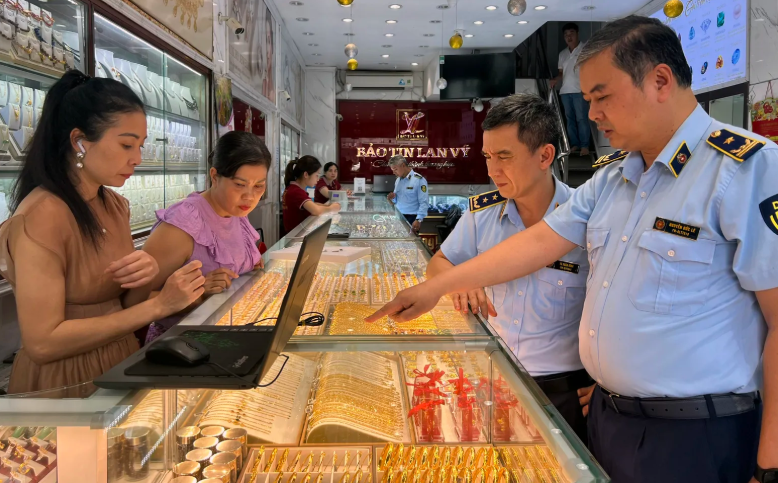Vietnam central bank sanctions gold firms for regulatory breaches
The State Bank of Vietnam imposed multi-billion dong fines on six major gold trading companies, highlighting shortcomings in the determination of gold prices.
The State Bank of Vietnam (SBV) on May 30 announced the results of inspections into six major gold trading enterprises and imposed fines totaling billions of dong for multiple violations of gold trading regulations.

Market surveillance forces inspect a gold trading outlet in Hanoi. Photo: Hoai Nam/The Hanoi Times
After conducting a thorough evaluation of six companies — Saigon Jewelry Company (SJC), DOJI Jewelry Group, Phu Nhuan Jewelry Joint Stock Company (PNJ), Bao Tin Minh Chau, Tien Phong Bank (TPBank), and Vietnam Export-Import Bank (Eximbank) — the SBV concluded that they comply with regulations on gold trading and data reporting and, to some extent, anti-money laundering measures. However, they still committed violations for which they received administrative fines ranging from approximately $15,700 to several million dollars.
Breaches of anti-money laundering regulations were found, including failure to properly identify clients or report large transactions, as well as breaches in documentation, accounting, and tax obligations. Furthermore, some firms were found to have provided misleading information about their products to attract customers, which constitutes an unfair business practice.
Regarding SJC, the SBV stated that there was no basis to conclude that the price increases between October 2, 2023, and April 15, 2024, were unreasonable. However, the SBV noted that pricing decisions were heavily influenced by one individual. Specifically, the General Director at the time, Le Thuy Hang, made all decisions regarding buying and selling gold. The state-owned company lacked internal regulations and procedures for determining pricing criteria and failed to allocate responsibilities among the departments involved in setting prices.
The SBV warned that allowing the General Director to determine prices alone posed significant risks, especially since SJC dominates the gold trading market.
The SBV’s inspection of DOJI revealed that certain individuals sold unusually large volumes of raw gold to the company, which was disproportionate to their personal profiles and professions. In some cases, gold was sold through individuals acting on behalf of another business, likely to avoid invoicing and corporate income taxes or to obscure the origin of the gold. These actions contributed to market instability.
Additionally, DOJI violated regulations by offering services such as gold mobilization and bullion custody via its Egold app and website without obtaining the necessary approvals.
Eximbank was found to have facilitated fictitious gold transactions. Employees expedited the procedures for counting and handling gold, as well as cash transactions. Consequently, some clients could buy and sell equal amounts of gold at the same time without physically delivering the gold or cash; they could simply sign the transaction documents. Only the price differential was settled, enabling speculative gains without any real trades.
This artificially inflated Eximbank’s trading volume. For example, three customers accounted for 15% of the bank’s total gold bullion trading volume, which did not accurately reflect actual market activity.
TPBank held SJC gold bullion on behalf of clients without sealing or recording serial numbers. The SBV also noted that some individuals repeatedly traded gold with TPBank for business purposes within a day or month, with annual transaction volumes reaching trillions of dong (equivalent to hundreds of millions of US dollars).
The SBV acknowledged that existing regulations are still ambiguous. Decree 24 does not require individuals to obtain licenses to trade gold bullion. However, individuals may buy and sell gold with authorized institutions. According to the Enterprise Law's definition of "business," if done for profit, such activity is considered a legitimate business right.
The SBV acknowledged that existing regulations are still ambiguous. Decree 24 does not require individuals to obtain licenses to trade gold bullion. However, individuals may buy and sell gold with authorized institutions. According to the Enterprise Law's definition of "business," if done for profit, such activity is considered a legitimate business right.
Lastly, PNJ was found to have committed similar violations, including inadequate reporting on gold bullion trading and providing misleading product information to attract competitors' customers, which suggests unfair competition. PNJ also breached tax regulations, anti-money laundering rules, and accounting standards, and engaged in improper invoice and documentation practices.
The State Bank of Vietnam (SBV) has referred violations involving invoices, accounting, and taxation at SJC, Bao Tin Minh Chau, and PNJ to the Ministry of Public Security for criminal investigation. Regarding DOJI and TPBank, the SBV submitted documentation to the Ministry's Department of Anti-Corruption, Economic Crimes, and Smuggling for further verification and investigation. The Ministry has since assigned the tax authorities to lead inspections and enforcement actions.












